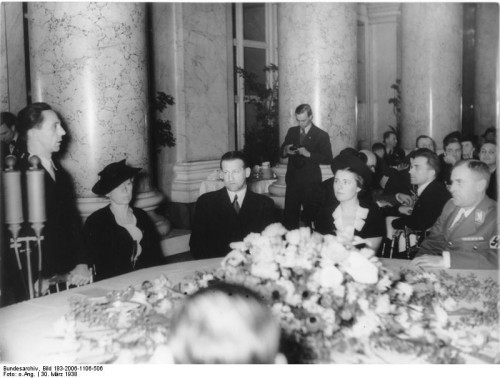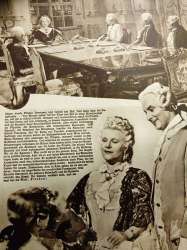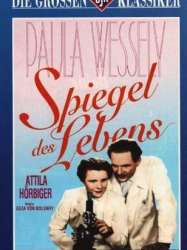Paula Wessely est une Actrice et Producteur exécutif Autrichienne née le 20 janvier 1907 à Vienne (Autriche)

Paula Anna Maria Wessely (20 January 1907 – 11 May 2000) was an Austrian theatre and film actress. Die Wessely (literally "The Wessely"), as she was affectionately called by her admirers and fans, was Austria's foremost popular postwar actress.
Her career proceeded, when in 1926 she became a member of the New German Theatre ensemble in Prague, where she and her future husband Attila Hörbiger (1896–1987) performed in Les Nouveaux Messieurs by Flers and Croisset. In 1927 she returned to the Volkstheater, playing in Ibsen's The Lady from the Sea and Wedekind's Spring Awakening. After being denied the role of Jenny in Brecht's Threepenny Opera in 1929, she quit and joined the ensemble of the Theater in der Josefstadt under director Max Reinhardt. Strongly insisting on major roles, she performed in Der Gemeine by Felix Salten, together with Attila Hörbiger and Hans Moser. Supported by Reinhardt, she played in Schiller's Intrigue and Love at the 1930 Salzburg Festival and in 1932 also in Hauptmann's Rose Bernd under director Karlheinz Martin at the Deutsches Theater in Berlin, acclaimed by the audience as well as by critics like Alfred Kerr and colleagues like Werner Krauss. On 23 December 1932, having taken singing lessons, she played the leading role in the premiere of Fritz Kreisler's Singspiel Sissy at the Theater an der Wien. From 1933 until 1938 she again performed at the Salzburg Festival as Gretchen in Goethe's Faust, together with Ewald Balser. In 1936 she made her first appearance on the Burgtheater stage in Shaw's Saint Joan.
Wessely, who was not particularly photogenic, was passed over in favor of Magda Schneider for the role of Christine in Max Ophüls' 1933 filmization of Arthur Schnitzler's Liebelei, a part she had played at Theater in der Josefstadt. Her first major movie role was that of Leopoldine Dur in the 1934 film Maskerade directed by Willi Forst, together with Adolf Wohlbrück. Further appearances in films like Episode by Walter Reisch, for which she was awarded the Volpi Cup as best actress at the 1935 Venice Film Festival, finally made her a star. In 1938 she was the speaking voice of Snow White in the first German-dubbed version of Disney's Snow White and the Seven Dwarfs. Immediately banned by the Nazi authorities after the Austrian Anschluss in the same year, this version was re-released in 1948 in Austria and in 1950 in West Germany (the first public performance ever), for the last time performed in 1957. As Disney Germany re-dubbed this movie in 1966 and again in 1994, both older versions are no longer available — although they are archived at London. Like her brother-in-law Paul Hörbiger, Wessely had publicly acclaimed the Anschluss, after which she smoothly continued her film and theatre career. Her most notorious movie appearance was in the anti-Polish Nazi propaganda film Heimkehr ("Homecoming") by Gustav Ucicky in 1941. Heavily criticized by Austrian intellectuals after World War II, she later publicly regretted her involvement.
On 23 November 1935 Wessely had married Attila Hörbiger at the Vienna Rathaus. They she had three daughters: Elisabeth Orth (born 1936), Christiane Hörbiger (born 1938) and Maresa Hörbiger (born 1945). All three daughters went on to become actresses, in particular Christiane Hörbiger, who today is one of the most popular actresses in German and Austrian cinema and television.
Though after the war she was initially under a profession ban by the Allied authorities, Wessely resumed her career 1945 at the Innsbruck State Theatre with the role of Christine in Liebelei, and again at the Theater in der Josefstadt in Brecht's The Good Person of Szechwan the next year. She also participated in the filming of Ernst Lothar's novel The Angel with the Trumpet in 1947, playing a half-Jewish woman. In 1957 she was again criticized for her appearance in the homophobic film Anders als du und ich by Veit Harlan. Apart from that, she worked mainly as a theatre actress at the Vienna Burgtheater together with her husband for more than 40 years, performing in Raimund's Der Alpenkönig und der Menschenfeind and Der Diamant des Geisterkönigs, again as Gretchen in Goethe's Faust, in Schnitzler's Das weite Land, in Hofmannsthal's Der Unbestechliche with Josef Meinrad and as Ella Rentheim in Ibsen's John Gabriel Borkman. When Attila Hörbiger died of a stroke in April 1987, aged 91, Wessely, by then undisputed doyenne of the Burgtheater, retired at the age of 80.
In her last years she lived a very secluded life in her hometown Vienna and suffered from major depression, caused by the death of her beloved husband. On 20 January 2000 she celebrated her 93rd birthday quietly, with only her three daughters and grandchildren at her home in Vienna-Grinzing. The following April she suffered an acute attack of bronchitis and was admitted to a hospital in Vienna. She died on 11 May 2000 at the venerable age of 93, "peacefully in her sleep", as the Burgtheater management announced the following day. She was buried two weeks later at the side of her husband in an Ehrengrab of the Grinzing cemetery.
Source : Wikidata
Paula Wessely

Nationalité Autriche
Naissance 20 janvier 1907 à Vienne (Autriche)
Mort 11 mai 2000 (à 93 ans) à Vienne (Autriche)
Naissance 20 janvier 1907 à Vienne (Autriche)
Mort 11 mai 2000 (à 93 ans) à Vienne (Autriche)
Biographie
She was born in Vienna, the daughter of butcher Carl Wessely, younger brother of the late Burgtheater actress Josephine Wessely (1860–1887), whom many believed or still believe to be her sister. Like her adored aunt, Paula Wessely prepared for an artistic career. From 1922 she attended the Vienna State Academy of Music and Performing Arts and later the Max Reinhardt Seminar, while she made her debut as an actress in 1924 at the Volkstheater, followed by several minor roles of the boulevard repertoire, also performing at the Raimund Theater.Her career proceeded, when in 1926 she became a member of the New German Theatre ensemble in Prague, where she and her future husband Attila Hörbiger (1896–1987) performed in Les Nouveaux Messieurs by Flers and Croisset. In 1927 she returned to the Volkstheater, playing in Ibsen's The Lady from the Sea and Wedekind's Spring Awakening. After being denied the role of Jenny in Brecht's Threepenny Opera in 1929, she quit and joined the ensemble of the Theater in der Josefstadt under director Max Reinhardt. Strongly insisting on major roles, she performed in Der Gemeine by Felix Salten, together with Attila Hörbiger and Hans Moser. Supported by Reinhardt, she played in Schiller's Intrigue and Love at the 1930 Salzburg Festival and in 1932 also in Hauptmann's Rose Bernd under director Karlheinz Martin at the Deutsches Theater in Berlin, acclaimed by the audience as well as by critics like Alfred Kerr and colleagues like Werner Krauss. On 23 December 1932, having taken singing lessons, she played the leading role in the premiere of Fritz Kreisler's Singspiel Sissy at the Theater an der Wien. From 1933 until 1938 she again performed at the Salzburg Festival as Gretchen in Goethe's Faust, together with Ewald Balser. In 1936 she made her first appearance on the Burgtheater stage in Shaw's Saint Joan.
Wessely, who was not particularly photogenic, was passed over in favor of Magda Schneider for the role of Christine in Max Ophüls' 1933 filmization of Arthur Schnitzler's Liebelei, a part she had played at Theater in der Josefstadt. Her first major movie role was that of Leopoldine Dur in the 1934 film Maskerade directed by Willi Forst, together with Adolf Wohlbrück. Further appearances in films like Episode by Walter Reisch, for which she was awarded the Volpi Cup as best actress at the 1935 Venice Film Festival, finally made her a star. In 1938 she was the speaking voice of Snow White in the first German-dubbed version of Disney's Snow White and the Seven Dwarfs. Immediately banned by the Nazi authorities after the Austrian Anschluss in the same year, this version was re-released in 1948 in Austria and in 1950 in West Germany (the first public performance ever), for the last time performed in 1957. As Disney Germany re-dubbed this movie in 1966 and again in 1994, both older versions are no longer available — although they are archived at London. Like her brother-in-law Paul Hörbiger, Wessely had publicly acclaimed the Anschluss, after which she smoothly continued her film and theatre career. Her most notorious movie appearance was in the anti-Polish Nazi propaganda film Heimkehr ("Homecoming") by Gustav Ucicky in 1941. Heavily criticized by Austrian intellectuals after World War II, she later publicly regretted her involvement.
On 23 November 1935 Wessely had married Attila Hörbiger at the Vienna Rathaus. They she had three daughters: Elisabeth Orth (born 1936), Christiane Hörbiger (born 1938) and Maresa Hörbiger (born 1945). All three daughters went on to become actresses, in particular Christiane Hörbiger, who today is one of the most popular actresses in German and Austrian cinema and television.
Though after the war she was initially under a profession ban by the Allied authorities, Wessely resumed her career 1945 at the Innsbruck State Theatre with the role of Christine in Liebelei, and again at the Theater in der Josefstadt in Brecht's The Good Person of Szechwan the next year. She also participated in the filming of Ernst Lothar's novel The Angel with the Trumpet in 1947, playing a half-Jewish woman. In 1957 she was again criticized for her appearance in the homophobic film Anders als du und ich by Veit Harlan. Apart from that, she worked mainly as a theatre actress at the Vienna Burgtheater together with her husband for more than 40 years, performing in Raimund's Der Alpenkönig und der Menschenfeind and Der Diamant des Geisterkönigs, again as Gretchen in Goethe's Faust, in Schnitzler's Das weite Land, in Hofmannsthal's Der Unbestechliche with Josef Meinrad and as Ella Rentheim in Ibsen's John Gabriel Borkman. When Attila Hörbiger died of a stroke in April 1987, aged 91, Wessely, by then undisputed doyenne of the Burgtheater, retired at the age of 80.
In her last years she lived a very secluded life in her hometown Vienna and suffered from major depression, caused by the death of her beloved husband. On 20 January 2000 she celebrated her 93rd birthday quietly, with only her three daughters and grandchildren at her home in Vienna-Grinzing. The following April she suffered an acute attack of bronchitis and was admitted to a hospital in Vienna. She died on 11 May 2000 at the venerable age of 93, "peacefully in her sleep", as the Burgtheater management announced the following day. She was buried two weeks later at the side of her husband in an Ehrengrab of the Grinzing cemetery.
Le plus souvent avec
Filmographie de Paula Wessely (15 films)
Actrice

Jedermann (1961)
, 1h36Réalisé par Gottfried Reinhardt
Genres Drame
Thèmes Adaptation d'une pièce de théâtre
Acteurs Ewald Balser, Walther Reyer, Paula Wessely, Ellen Schwiers, Paul Dahlke, Sonja Sutter
Rôle Glaube
Note57%






Die unvollkommene Ehe (1959)
, 1h31Réalisé par Robert A. Stemmle
Genres Drame, Comédie
Acteurs Paula Wessely, Johanna Matz, Johannes Heesters, Dietmar Schönherr, Friedl Czepa, Raoul Retzer
Rôle Frau Dr. Winifred Lert
Note57%






Le Troisième Sexe (1957)
, 1h31Réalisé par Veit Harlan
Origine Allemagne
Genres Drame
Thèmes L'adolescence, L'enfance, Sexualité, Homosexualité, Enfants et les adolescents LGBT, LGBT, LGBT
Acteurs Christian Wolff, Paula Wessely, Paul Dahlke, Hans Nielsen, Herbert Hübner, Kurt Vespermann
Rôle M Christa Teichmann
Note54%





Klaus Teichmann, un lycéen de 17 ans, a une relation étroite avec son ami d'école Manfred et voit souvent l'antiquaire Boris Winkler, chez qui les jeunes garçons font connaissance avec la musique électronique et l'art contemporain. Les parents de Klaus se soucient des penchants de leur fils et portent plainte contre Winkler mais, comme rien n'est établi, l'affaire en reste là.

An jedem Finger zehn (1957)
, 1h44Réalisé par Veit Harlan, Erik Ode
Origine Allemagne
Genres Drame, Musical
Thèmes La musique, Musique
Acteurs Paula Wessely, Germaine Damar, Joséphine Baker, Walter Giller, Loni Heuser, Christian Wolff
Rôle Christa Teichmann
Note55%





Fips Kluger, Franz Hempel et le trompettiste Macky sont arrêtés par la police, parce que leur groupe gêne la circulation, puis libérés. Fips raconte comment on en est arrivé là :

Maria Theresia (1951)
, 1h31Réalisé par Emil-Edwin Reinert
Origine Autriche
Genres Drame, Historique
Acteurs Paula Wessely, Erik Frey, Rosa Albach-Retty, Marianne Schönauer, Rudolf Fernau, Dagny Servaes
Rôle Marie-Thérèse
Note57%





En 1762, l'impératrice autrichienne Marie-Thérèse reçoit une lettre du front la mettant en face de la question d'attaquer la Prusse ou non. Elle décide de mettre fin à la guerre et d'un traité de paix, même s'il lui est difficile de se concentrer sur les affaires d'État. Elle a des problèmes personnels, elle soupçonne son mari François d'être de nouveau avec sa maîtresse, la comtesse Aliano. La nuit, Marie-Thérèse est seule. Le lendemain, son fils lui apporte un médaillon que son père a perdu. À l'intérieur, il y a le portrait de la comtesse Aliano.

Der Engel mit der Posaune (1948)
, 2h12Réalisé par Karl Hartl
Origine Autriche
Genres Drame, Historique
Acteurs Paula Wessely, Helene Thimig, Hedwig Bleibtreu, Maria Schell, Alma Seidler, Attila Hörbiger
Rôle Henriette Alt, née Stein
Note74%





En 1764, Christoph Alt, un facteur de pianos viennois, fonde une fabrique de pianos et construit une maison où se trouve, au-dessus de la porte, un ange avec une trompette.

Retour au foyer (1941)
, 1h36Réalisé par Gustav Ucicky
Genres Drame
Thèmes Documentaire sur la guerre, Documentaire historique, Politique, Documentaire sur la Seconde Guerre mondiale
Acteurs Paula Wessely, Attila Hörbiger, Carl Raddatz, Otto Wernicke, Ruth Hellberg, Elsa Wagner
Rôle Maria Thomas
Note36%





Tourné sur ordre express de Goebbels pour justifier l’invasion de la Pologne le 1er septembre 1939, et qui est parfois considéré comme le film de propagande nazie le plus abouti 24. On y voit les Allemands de Pologne réclamer en vain le respect des minorités et subir les pires humiliations. Ils sont sauvés des mains de Polonais enragés par les troupes du Reich.

Maria Ilona (1939)
, 1h34Réalisé par Géza von Bolváry
Genres Drame
Acteurs Paula Wessely, Willy Birgel, Paul Hörbiger, Hedwig Bleibtreu, Rosa Albach-Retty, Heinz von Cleve
Rôle Maria Ilona von Wolkersdorf
Note61%






Spiegel des Lebens (1938)
, 1h35Réalisé par Géza von Bolváry
Genres Drame
Acteurs Paula Wessely, Lina Woiwode, Raoul Aslan, Attila Hörbiger, Karl Ehmann, Maria Eis
Rôle Johanna 'Hanna' Karfreit
Note65%






Die ganz großen Torheiten (1937)
, 1h35Genres Drame
Acteurs Paula Wessely, Rudolf Forster, Hilde Wagener, Gustav Waldau, Hedwig Bleibtreu, Kurt Meisel
Rôle Therese Brandl
Note65%






Die Julika (1936)
, 1h29Réalisé par Géza von Bolváry
Genres Drame, Romance
Acteurs Paula Wessely, Attila Hörbiger, Gina Falckenberg, Karl Ehmann, Gisa Wurm
Rôle Julika
Note64%






Episode (1935)
, 1h45Réalisé par Walter Reisch
Origine Autriche
Genres Comédie
Acteurs Paula Wessely, Karl Ludwig Diehl, Otto Tressler, Walter Janssen, Friedl Czepa, Rosa Albach-Retty
Rôle Valerie Gärtner
Note65%





In Vienna in 1922 daily life is dominated by inflation and unemployment. In the evenings, the population attempt to divert themselves from the miseries of the economic situation by indulgence and excess in bars and clubs. Morale is low, and sinking further.

Maskerade (1934)
, 1h30Réalisé par Willi Forst
Genres Comédie, Comédie romantique, Musical, Romance
Thèmes La musique, Musique, Adaptation d'une opérette
Acteurs Anton Walbrook, Paula Wessely, Olga Tschechowa, Walter Janssen, Hans Moser, Julia Serda
Rôle Leopoldine Dur
Note75%





The film is set in Viennese high society of about 1900. After a masked carnival ball, Gerda Harrandt (Hilde von Stolz), wife of the surgeon Carl Ludwig Harrandt (Peter Petersen), allows the fashionable artist Ferdinand von Heidenick (Adolf Wohlbrück) to paint a portrait of her wearing only a mask and a muff. This muff however belongs to Anita Keller (Olga Tschechowa), in secret the painter's lover but also the fiancée of the court orchestra director Paul Harrandt (Walter Janssen), the brother of Gerda's husband.

So endete eine Liebe (1934)
, 1h34Réalisé par Karl Hartl
Origine Allemagne
Genres Drame, Historique
Acteurs Paula Wessely, Willi Forst, Gustaf Gründgens, Franz Herterich, Maria Koppenhöfer, Rose Stradner
Rôle L'archiduchesse Marie-Louise
Note67%





Comme Joséphine ne peut pas donner un héritier à Napoléon, Talleyrand, conseiller politique de Napoléon, fait tout son possible pour la convaincre que le divorce est inévitable. L'empereur a absolument besoin d'un fils. Joséphine a à cette époque 47 ans et souffre beaucoup d'avoir à se séparer de son mari. Après la prononciation du divorce, Metternich, qui contrôle le destin de l'Autriche, reçoit une lettre de Talleyrand. Napoléon lui-même se rapproche de L'empereur François d'Autriche, car le Corse veut une princesse Habsbourg à ses côtés et sur le trône français. Metternich lui répond que l'empereur est d'accord et lui présentera sa fille Marie-Louise, 19 ans.

Sodome et Gomorrhe (1922)
, 1h37Réalisé par Michael Curtiz
Origine Autriche
Genres Drame
Thèmes Religion, La bible, Religion juive, Film catastrophe
Acteurs Lucy Doraine, Walter Slezak, Victor Varconi, Béla Balázs, Willi Forst, Paula Wessely
Note59%





À Londres, l'homme d'affaires et spéculateur Jackson Harber provoque une panique boursière. Dans le même temps, il "achète" la jeune Mary Conway à sa mère car il veut la "posséder". Mary, très futile, accepte ce "marché". Les "fiançailles" sont organisées au château d'Harber, donnant lieu à une fête grandiose, pleine de débordements et de débauche. Le fils du spéculateur, Eduard, arrive alors, accompagné de son précepteur, un prêtre. Ce dernier recueille la confession d'un mourant, le sculpteur Harry Lighton, venu là se suicider par désespoir, car la jeune fiancée, dont il était épris, l'a repoussée. Bientôt, Mary séduit Eduard et le pousse à tuer son père. Les deux jeunes gens sont arrêtés et condamnés à mort. Dans sa cellule, Mary se transporte en rêve à Sodome.
 Connexion
Connexion


